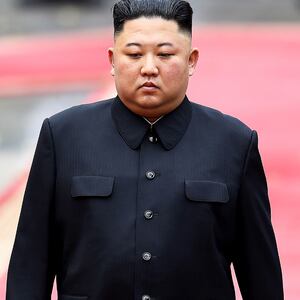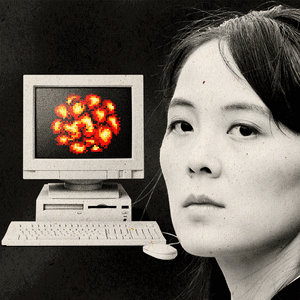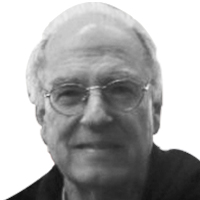Michael Spavor, the spirited Canadian who twice finessed visits of Chicago Bulls legend Dennis Rodman to Pyongyang—including for a birthday bash with leader Kim Jong Un—was sentenced to 11 years in a Chinese prison last week. The crime for which Spavor was found guilty, after having been held virtually incommunicado since December 2018, was to have spilled state secrets, including pictures, to a former Canadian diplomat who’s also been jailed all this time.
Spavor’s conviction and sentencing marks the disastrous downfall of an entrepreneur with close ties to North Korea. As the founder and operator of the “non-profit” Paektu Cultural Exchange in Dandong, the bustling Chinese city across the Yalu River from the decrepit North Korean city of Sinuiju, he specialized in tours to China promoting a North Korean agenda of cultural and economic enrichment. It was in Dandong that the court, fed what Chinese prosecutors viewed as “evidence,” found him guilty as charged while the other Canadian, Michael Kovrig, awaits his verdict and sentencing.

Having gotten to know Spavor in email communications and meetings during his visits to Seoul, I enjoyed hearing him boast about his professional exploits. In one evening at the Seoul Foreign Correspondents’ Club, he was the life of the party, embracing anyone within arm’s reach, raising his glass in toasts, laughing and joking about his role as a tour operator with one specialty: North Korea. However much Spavor had imbibed, however, he was careful not to say anything that might dim the magic of his rapport with the North Koreans, who obviously saw him as a useful intermediary.
It would not, however, take much for the Chinese legal system to imprison just about anyone who got on the wrong side of authorities. His trial, of course, was conducted behind closed doors, with no one there to record what was said and no way he could call his own witnesses or have a lawyer defending him, much less questioning the system under which he was held without bail and virtually no visitors other than occasional brief meetings with Canadian consular officers—before COVID-19 provided a pretext for cutting off contact.
Seemingly outgoing and always super-friendly, Spavor, now 45, was glad to chat and clapped shoulders with just about anyone he met. Speaking of his accomplishments, however, he had a way of grinning and clamming up when asked what he really knew of North Korea’s atrocious human rights record or the innermost secrets of the Kim dynasty. I got to know him over the course of attempts to gain access to North Korea.

For all his high spirits and camaraderie, he was smart enough to tell me, in person and in emails, that he just was not able to get me a visa to North Korea since I was a known quantity as an American and a journalist. I did manage to visit North Korea a number of times, twice for visits of more than two weeks under other auspices, claiming to be a teacher or scholar.
On one of those visits, I actually ran into him with another tour group, as always putting on an old friends act that belied the dedication with which he arranged contacts between North Korea and eager foreign visitors.
“BACK IN SEOUL!” began one message that he sent advertising a visit to South Korea planned for early December 2018. His merry tone, advising contacts he’d be coming down from Dandong “for a few days for new consulting work,” leaves no doubt he hadn’t a clue what was coming when he got back to China. It wasn’t until he failed to show up that we got the news of his arrest.
Interspersed with smiling emoji, he rambled on in his usual hyper-convivial style: “Yeah! And a few meetings,” said his email, which I preserved as a colorful reference to one of the more engaging intermediaries between curious foreigners and a system that remains closed to all but superficial look-sees.
“I’ll be busy but if you want to have a few Makgeollis (Korean rice wine) or beers with some of my friends come out on Tues and/or Fri,” he amiably invited everyone. “All are welcome, feel free to tag along and bring friends.”
Spavor was at his effervescent party-going best when he joined Dennis Rodman on the occasion of Kim Jong Un’s 30th birthday in Pyongyang in 2014. Spavor, whose travel agency handled details of the visit, holds the distinction of being one of the few westerners to have met Kim.
The January 2014 trip is most memorable for Rodman singing “Happy Birthday” to the North Korean leader, who’d inherited his post barely more than two years earlier after the death of his long-ruling father, Kim Jong Il, in December 2011. Reuters quotes Spavor as describing the goings-on as “a blast” in which “we hung out for three days,” surely “the most amazing experience I’ve had in my life.”
Photographs show Rodman cavorting with Kim at a basketball game and Spavor sipping drinks with the North Korean leader on a yacht off the east coast port of Wonsan, near one of Kim’s palatial residences.

All of which, according to a veteran diplomatic source who requested anonymity, may have contributed to Spavor’s undoing. “What he was apparently doing with NK was always extremely risky,” the source told me in an email.
Sure, he went on, “There must have been tons of intelligence officers from many states’ services all over him for several years at least.” But the Chinese, he explained, “would of course have been deeply suspicious of him and of those they assumed he was working for. And even if they weren’t sure he was working for a service, how easy they would have regarded it to tar him with that when they needed someone to hold hostage against Canada.”
As for why the Chinese would go after Spavor when he was such a friend of North Korea, he said, “the Chinese look down on and even hate the North Koreans,” despite their longstanding alliance with North Korea going back to the Korean War. Moreover, they may have assumed he “wasn’t really a friend of NK but was working for others.”
Spavor may still appeal his sentence, but both he and Kovrig are widely viewed as pawns in a much larger power game.
They were both picked up almost immediately after the Vancouver 2018 arrest of Meng Wanzhou, Chinese tech giant Huawei’s chief financial officer, on an American request for her extradition from Canada. Quasi-free on $7.5 billion bail, she goes nowhere without an escort, has to wear an ankle bracelet and must return to her luxury digs at night. Hearings in Vancouver have just ended, and the court is expected to decide in two months whether to send her to the U.S. for trial on charges of fraudulently violating sanctions banning trade with Iran in statements to HSBC Holdings.
While U.S. relations with China deteriorate amid military and trade disputes, the case is an explosive international issue considering Huawei’s global reach as a technological giant. Spavor and Kovrig can only hope the court rules in favor of Meng and Huawei, which has vigorously denounced her arrest as politically motivated.
As for the Chinese case against Spavor, the Canadian ambassador to China, Dominic Barton, said it “lacked both fairness and transparency.” Some of the so-called evidence against “the two Michaels,” as they are sometimes called in Canada, revolves around photographs Spavor was said to have taken of military aircraft. Barton, according to NK News, a website in Seoul that tracks North Korea, said both Spavor and Kovrig “are being detained arbitrarily” and vowed to “continue to call for their immediate release.” The claim of photographing military aircraft is suspect since Chinese military planes are often seen at or near commercial airports, and are easily photographed by anyone snapping souvenir shots.
Spavor, meanwhile, remains irrepressibly upbeat, at least to judge from a comment on the case as transmitted via the Canadian embassy in Beijing. “I am in good spirits,” NK News quoted him as saying. “I want to get home.”



